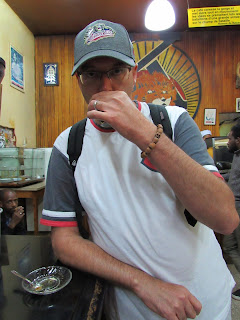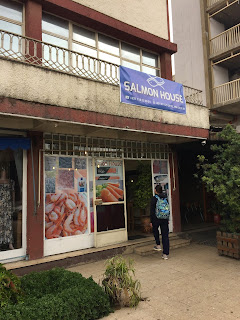The best-laid plans of mice and men.
The idea on Saturday was to visit the most famous cafe in Ethiopia, but not before first having lunch in the vicinity. Perusing my Lonely Planet guidebook, I settled on a place called the Reizal Café, about a nine-minute walk from the coffeehouse. According to LP, the "slick modern cafe speedily (italics mine) serves" various international dishes "to a fashionable, young crowd". The latter part of the description is accurate, but the former didn't exactly jive with our experience on Saturday afternoon. The female server who seated us took our order: a pepperoni pizza and a bottle of Ambo Mineral Water for me; an order of spring rolls and an Ambo for my wife; and a tuna melt and a cup of hot chocolate for our daughter. A little while later, a male server came by to inform us that they were out of the meat-filled spring rolls, hot chocolate and Ambo; Shu-E opted for the veggie spring rolls and a cup of coffee, Amber a bottle of regular water and your humble scribe a Coca-Cola. More time passed, and the drinks and my wife's spring rolls arrived. The waiter returned later to confirm my daughter's tuna melt order, which eventually arrived after another lengthy wait. I was beginning to worry about my pizza, and after almost 75 minutes of sitting I called another server over and re-ordered my pizza. The pizza finally showed up at our table, but in all it was an unintended two-hour dining experience. Next time I'll take Shu-E's advice and not rely on guidebooks when it comes to choosing places to eat.
Looking on the bright side, the pizza was pretty good, and the total bill came to only 289 birr ($9.89). Plus there was free entertainment. Not once, but twice, groups of musicians entered the cafe to perform tribal music and dancing. I wanted to video the performers, but was afraid that doing so would obligate me to pay them (some customers were giving them money). My wife, on the other hand, was less than pleased by the intrusion. Already uncomfortable from the exhaust fumes she inhaled on the cab ride from our house, the loud music (including the blaring of what sounded like a vuvuzela) only added to her discomfort (the bitterness of the coffee didn't help). Finally, at the end of our meal, the rain was pouring down outside, as the second group of musicians/dancers waited for the skies to clear up. We should've done the same, but Shu-E didn't want to spend any more time inside Reizal:
The cafe may have been a letdown, but Tomoca ቶሞካ ቡና lived up to the hype. There are several branches all over town (including one about a fifteen minute-walk from our house), but the 1953 Italian-style cafe on Wawel Street is the original:
Amber poses with some coffee plants outside Tomoca. It's beyond the scope of this humble blog to dive into the importance of coffee in Ethiopia's culture and economy. Suffice it to say the country is where the Coffee arabica plant originated; coffee makes up a third of Ethiopia's exports, and Ethiopian coffee production accounts for 3% of the global market. And then there's the **coffee ceremony:
My wife and I both ordered the regular coffee, at only 16 birr (55¢) for a cup. It was very bitter, but adding sugar as the Ethiopians do made it more palatable:
The cafe is standing-room only (no tables). By the end of my shot, I was hooked:
The interior is small:
Beans are for sale but Shu-E wasn't interested in purchasing any. There's still plenty of time:
Following a brief look around Book World መጽሐፍ ዓለም, one branch of a local bookstore chain featuring speciality English-language titles on Ethiopia (had it had a copy of The Addis Ababa Massacre: Italy's National Shame in stock, a title I'd previously come across at Washington D.C.'s Politics and Prose, I might've made a purchase), we returned home by taxi in the late afternoon. A scene from the cab window - I don't know what the modern building is in the background, but to the left you can glimpse the tracks of Addis Ababa's አዲስ አበባ light rail system, the first of its kind in sub-Saharan Africa:
Despite the weather, the traffic, the crowds and lunch, I had a pretty good time on Saturday. It was our first occasion to venture into the capital's Piazza district, an area the legacy and architecture of which "are owed to the Italian occupation" of 1936-1941 (to paraphrase my now somewhat-maligned LP guide). My long-suffering wife may be finding Africa a little overwhelming at the beginning of our tour; I, on the other hand, am still in that initial stage where everything is exhilarating. Our daughter, being at the beginning of her teenage years, is content playing with various devices and waiting for school to begin.
Stairs. The other side is even more interesting in that it appears to be joined to the building being erected next door
Shu-E and Amber amble down a residential street in a neighborhood filled with upper-class houses and diplomatic residences. Not our ሰፈር, in case you're wondering...
* Buna ቡና, the Amharic word for "coffee"
**Speaking of the coffee ceremony, an extremely abridged version was demonstrated during orientation day at my daughter's new school:




























































